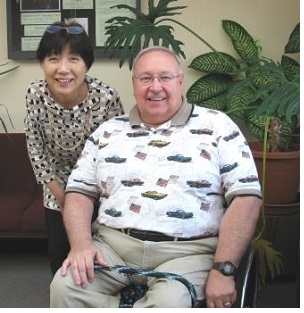Japanese Professor Keiko Kano Studies Student Accommodations

The U.S. is the world leader in independent living, says Keiko Kano. The Japanese professor of Social Work at Kansai University in Osaka made a week-long visit to the University of Kansas in September 2015 to learn more about programs for students with disabilities, with a stop at the Research & Training Center on Independent Living.
Kano first visited the Center 25 years ago when her husband was on sabbatical in KU’s Chemistry department. During that year, she conducted her own research on community-based services for people with disabilities, working often with Center Director Glen White.
“I watched the signing of the Americans with Disabilities Act on TV in 1990,” Kano recalls. “That was very memorable.” Now she is researching the way American universities provide services for students with disabilities on behalf of the Human Rights Research Center of Kansai University.
“We are trying to catch up to the U.S.” Kano said. Japan passed an anti-discrimination law in 2013 that is similar to the American ADA, so universities now have to admit students with disabilities and provide reasonable accommodations. “But this is a very new idea for the Japanese. Most physical barriers have been removed, but the idea of ‘reasonable accommodations’ is not well understood,” she explained.
White shared information with Kano about Access to Success, a program he and Jean Ann Summers have created to inform American students about their rights in post-secondary institutions and to help them develop skills for requesting accommodations, such as note-takers or extra time for exams. She also visited KU’s Academic Achievement and Access Center to learn about implementing programs for students with disabilities.
According to Kano, Japan’s school system had been segregated since 1974, when “special schools” were created for students with disabilities. Now that inclusive education is the law, elementary and secondary students can attend their local schools, then can expect accommodations when they attend a college or university.